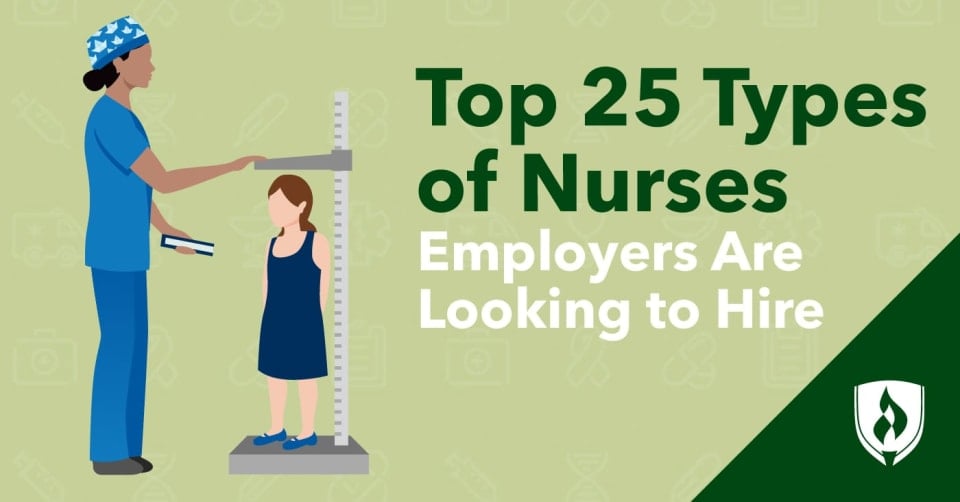
You’re no stranger to the world of nursing—from the movies and TV shows to the news headlines about the nursing shortages. But now that you’re considering capitalizing on the career opportunity, you’re noticing that there are a lot of different types of nurses out there.
The good news is that there are in-demand nursing positions for individuals of all education levels. So whether you’re looking to just dip your toes in the field or ready to commit to a more extensive degree, there are different types of nursing careers to consider.
We identified the top 25 types of nurses healthcare facilities are seeking, and that’s only a portion of your options. Get acquainted with these in-demand nursing careers to get a feel for your potential career path.
Get Your Nursing School Questions Answered at a Nursing Information Session
25 Different types of nurses in high demand
With so many different types of nurses out there, how can you decide which nursing specialty is right for you?
We used real-time job analysis software to examine nearly 1.9 million nursing job postings from the past year.* Our analysis helped us identify the types of nurses in highest demand. Keep reading to explore these different types of nursing positions, along with a more detailed breakdown of each role and the nursing training needed.
1. Registered nurse (RN)
Registered nurses assist physicians in hospitals and in a variety of medical settings. They perform multiple tasks related to patient care, case management and treatment planning. It’s no surprise that RNs rank first on this list because they can specialize in several areas, including many others listed below.
2. Licensed practical nurse (LPN)
Licensed practical nurses perform a variety of tasks under the supervision of an RN or doctor. They administer medicine, check vital signs and give injections. If you want to dip your foot in the world of nursing, becoming an LPN is often a great way to start.
- Education needed: Practical Nursing Diploma
- Relevant certifications: None required
Start your nursing career with a Practical Nursing (LPN) Diploma.
Learn More About Our Practical Nursing (LPN) Program3. Medical-surgical nurse
These nurses provide direct care to adult patients in a variety of settings. Medical-surgical (MS) nursing is often considered the foundation for healthcare. These professionals must carry out a vast array of tasks, and must possess excellent assessment, organizational, technical and prioritization skills. MS nurses treat all kinds of ailments, meaning they need to be flexible and must provide holistic care.
- Education needed: ADN or BSN
- Relevant certifications: CMSRN certification
4. Intensive care unit (ICU) registered nurse
These RNs work in the intensive care unit (ICU) of hospitals, providing complex care to those with very serious illnesses or injuries. ICU nurses, also referred to as critical care nurses, may work in specialty hospitals or with patients in a certain age bracket, such as children in the pediatric ICU. Due to the difficulty of this position, most hospitals require training or continued education before employing an RN in the ICU.
- Education needed: BSN preferred
- Relevant certifications: CCRN certification
5. Nurse practitioner (NP)
While some nurse practitioners work under the supervision of a physician, more and more are gaining autonomy, taking on some of the many roles of a physician. NPs can diagnose diseases, prescribe medications and initiate treatment plans. If you’re seeking more independence and responsibility without some of the educational requirements of a physician, becoming an NP might be the perfect fit.
- Education needed: Graduate degree
- Relevant certifications: Dependent on specialty
6. Travel nurse
A travel nurse works temporary jobs nationally and internationally, sometimes for weeks at a time and sometimes for a few years. Travel nurses perform many of the same duties as a standard RN, often working for an agency that supplements staff to facilities in need. This could be a great gig for someone who enjoys travel and change with few strings attached.
7. Emergency room nurse
An emergency room nurse will treat patients experiencing trauma or injury in a hospital ER. They will encounter a variety of conditions and have to stabilize patients dealing with traumatic events and injuries. This position would be good for someone who can handle high stress scenarios and find it rewarding to be a presence of calm amidst chaos.
- Education needed: ADN or BSN
- Relevant certifications: CEN certification
8. Nursing assistant
While not technically nurses, nursing assistants work closely with patients under the direction of nursing staff. They provide personal care for patients, including helping them bathe, get dressed, use the bathroom, eat and more. Becoming a nursing assistant is a great entry point for those looking to get a taste of the nursing field.
- Education needed: High school diploma and post-secondary certificate
- Relevant certifications: Varies by state—some may require certification for employment
9. Operating room (OR) nurse
Operating room (OR) nurses, also referred to as perioperative nurses or scrub nurses, care for patients before, during and after surgery. They work alongside surgical teams and act as a liaison between them and the patient’s family. These nurses also equip patients and their families for postoperative care. This is a good fit for someone empathetic to the stress of surgery on individuals and families.
- Education needed: ADN or BSN
- Relevant certifications: CNOR certification
10. Nurse case manager
Nurse case managers coordinate long-term care for patients in hopes of keeping them healthy and out of the hospital. They can choose to specialize in treating people with diseases, like cancer, or can choose to work with a specific age group, such as geriatrics. You should consider becoming a nurse case manager if you enjoy research, coordination and scheduling.
- Education needed: BSN or MSN
- Relevant certifications: CCM certification
11. Home health nurse
A home health nurse cares for patients in the comfort of their own homes. Often times, these patients are in geriatric care or young people with developmental or mobility issues. This is an ideal position for someone looking to work outside of a traditional hospital setting, but still enjoys working with patients.
- Education needed: Practical nursing diploma, ADN or BSN
- Relevant certifications: Dependent on specialty
12. Post-anesthesia care unit (PACU) nurse
Post-anesthesia care unit (PACU) nurses work with patients as they regain consciousness from anesthesia after surgery. Also known as perianesthesia nurses, they are prepared to handle patients who react aversely, wake up in pain or confusion or experience other problems. PACU nurses are a comforting presence to those coming out of anesthesia and can offer tips for their recovery.
- Education needed: ADN or BSN
- Relevant certifications: CPAN certification
13. Neonatal intensive care unit (NICU) nurse
NICU nurses care for premature and critically ill newborns in the neonatal intensive care unit of a hospital. They care for infants needing immediate medical attention, connect them to life-giving technology and comfort them when they are in distress.
- Education needed: ADN or BSN
- Relevant certifications: RNC-NIC certification
14. Staff nurse
Staff nurses work in a variety of settings including rehab centers, critical care, psychiatric and outpatient facilities. They provide direct patient care, administer medications, perform IV therapy and more. Staff nurses often have the opportunity to advance and supervise other medical staff, like RNs or LPNs. Those with strong leadership skills may want to consider this option.
15. Labor & delivery nurse
Labor and delivery nurses help welcome new lives into the world every day. They care for both mother and baby throughout the process of labor, childbirth and even after birth. A labor and delivery nurse may aid in inducing labor, administering epidurals, timing contractions and educating the mother with nursing advice after the baby is born.
- Education needed: ADN or BSN
- Relevant certifications: RNC-OB certification
16. Oncology nurse
Oncology nurses provide care for cancer patients and those at risk of the disease. They monitor physical conditions, prescribe medication and administer chemotherapy and other treatments. This is a good fit for someone interested in a challenging, yet rewarding, career that is research-oriented.
- Education needed: ADN or BSN
- Relevant certification: OCN certification
17. Nurse manager
Nurse managers oversee the nurses on the floor who care for patients. They wear many hats and handle a lot of administrative duties. Sometimes called nurse supervisors, they are often responsible for recruitment and retention of nurses, as well as occasionally collaborating with doctors on patient care and assisting families in need. This is a great option for those hoping to step away from direct patient care after gaining some experience in the field.
- Education needed: BSN or MSN preferred
- Relevant certifications: CNML certification
18. Telemetry nurse
Sometimes called progressive care nurses, these professionals work in the telemetry unit of a hospital, where patients are often in critical condition and are in need of constant care and observation. In addition to typical nursing duties, telemetry nurses are trained to monitor patients’ vital signs with electrocardiograms and other technical equipment. This is a great nursing specialty if you’re passionate about technology and can interpret data.
- Education needed: ADN or BSN
- Relevant certifications: PCCN certification
19. Pediatric nurse
These nurses work in the pediatric department of a clinic or hospital, which specializes in treating children from infants to teenagers. Pediatric nurses carry out all of the typical nursing duties, as well as administering vaccinations and treating common ailments that are common in children. If you love kids and are patient and creative, this is the perfect nursing track for you to consider.
- Education needed: ADN or BSN
- Relevant certifications: CPN certification
20. Psychiatric nurse
These nurses play a vital role in the psychiatric care process for patients and families suffering from mental health illnesses. Psychiatric nurses meet with patients to discuss and note symptoms, implement care plans, administer medications, update patient charts, assist in basic needs, facilitate group therapy projects and more. They work closely with the treatment team to provide the patient with total care and attention to help them live a productive life.
21. Radiology nurse
Radiology nurses, also called radiologic nurses or medical imaging nurses, care for patients undergoing diagnostic imaging procedures or radiation therapy. They work closely with physicians and radiologic technologists to educate and prepare patients for X-rays, CT scans, MRIs, ultrasounds and other tests.
- Education needed: BSN preferred
- Relevant certifications: CRN certification
22. School nurse
These nurses work in schools to help support student learning. School nurses care for students who are sick or hurt during the school day. They also implement strategies to help prevent illness and injury and promote student and staff health and wellness. If you love children and enjoy variety in your workday, this is a great option in the nursing field.
- Education needed: ADN or BSN
- Relevant certification: NCSN certification
23. Nurse anesthetist
A certified registered nurse anesthetist (CRNA) is a type of advanced practice registered nurse. They are responsible for administering anesthesia to patients and provide care before, during and after medical procedures. It’s the CRNA’s job to determine the best anesthetic plan for the patient, administer the anesthesia and monitor the patient’s vitals throughout the procedure.
- Education needed: MSN or DNP
- Relevant certification: NBCRNA certification
24. Dialysis nurse
Dialysis nurses, sometimes referred to as nephrology nurses, treat patients who are suffering from kidney failure to help their kidneys to work again. They care for patients undergoing dialysis treatments and educate them on their condition and medications. This is a great specialization for those seeking a rewarding career, because dialysis is an effective life-prolonging treatment for patients with kidney disease.
- Education needed: ADN or BSN
- Relevant certifications: CDN certification
25. Cardiovascular nurse
Cardiovascular nurses care for patients with heart or blood vessel diseases. Also called cardiac nurses, they typically work in a hospital’s intensive care unit (ICU) with individuals who have suffered myocardial infarctions, have life-threatening arrhythmias or have undergone open-heart surgery. These nurses must possess strong critical-thinking skills and be able to work in a high-pressure environment.
Which types of nursing jobs interest you?
As you can see, there are several different types of nurses out there—and many jobs available to nurses with the right qualifications. You can narrow your employment search based on the specialties that interest you. This job variety is just one of the many appealing reasons to become a nurse.
You are now familiar with 25 types of nursing positions employers are looking to fill. If you want to qualify yourself for one of these in-demand jobs, the first step is acquiring the proper training and education. Let us help you map out your next steps in our article, "Your Step-by-Step Guide to Getting into Nursing School.".
Related Articles:
- What Is Pain Management Nursing? A Look at This Helping Healthcare Specialty
- What Is an Infection Control Nurse? A Look at This Specialized Role
- Pros and Cons of Being a Travel Nurse: Expert Insight for New Nurses
- What Is Holistic Nursing? Healing From the Inside Out
- Types of Nursing Degrees: Diagnosing Your Ideal Healthcare Career
- Cultural Diversity in Healthcare: Why It Matters, and What’s Next
*Burning-Glass.com (analysis of 1,899,315 nursing job postings, June 01, 2019 – May 31, 2020).
Rasmussen University does not offer programs to prepare students for every occupation profiled in this article; please see www.rasmussen.edu/degrees/nursing/ for a list of the programs we offer.
EDITOR’S NOTE: This article was originally published in April, 2015. It has since been updated to include information relevant to 2020.




